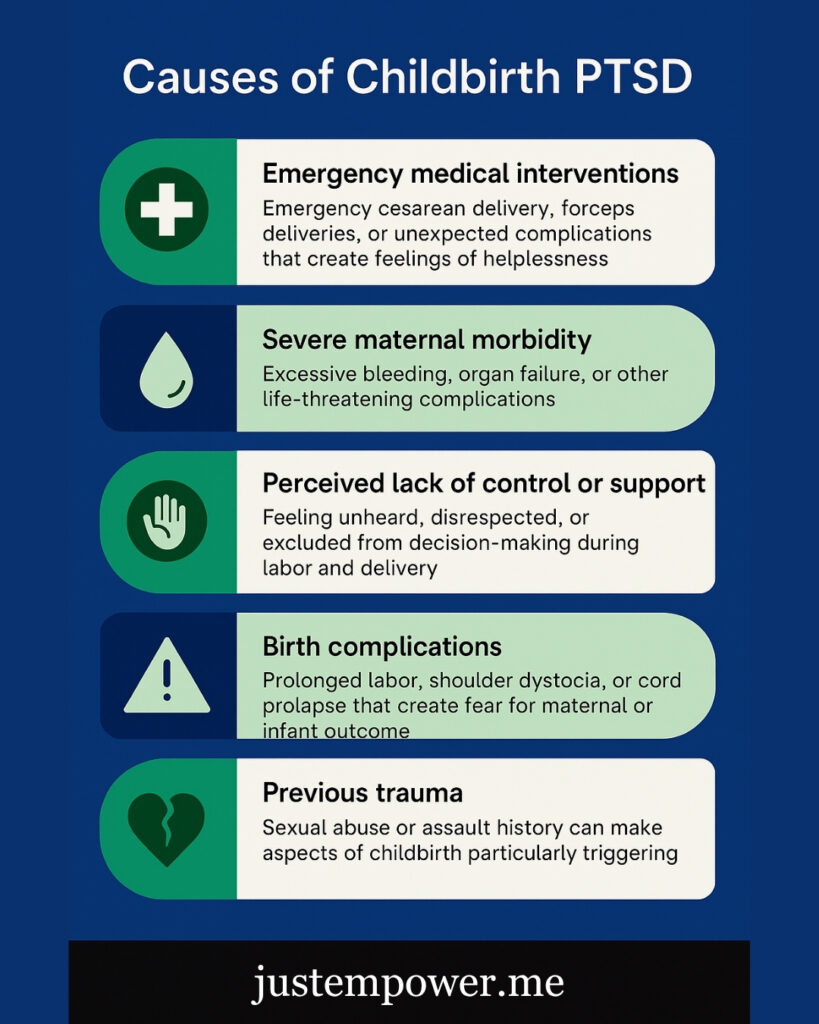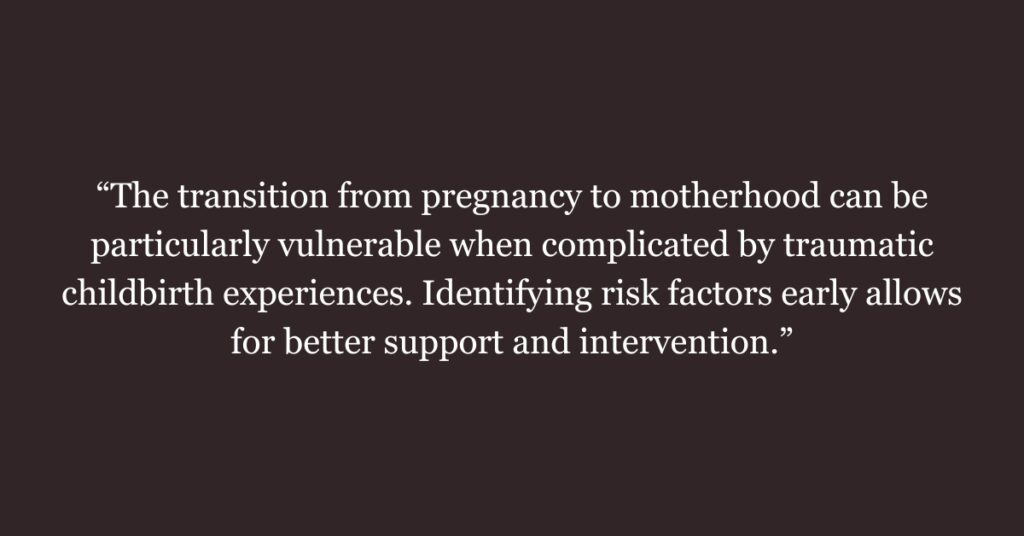Childbirth, while often celebrated as a joyous event, can sometimes leave lasting psychological scars that manifest as post traumatic stress disorder (PTSD). This condition affects between 5-20% of women who give birth, yet remains widely misunderstood and underdiagnosed (Source). The traumatic birth experience that triggers childbirth PTSD can profoundly impact women’s mental health and significantly alter the early parenting journey.
In this comprehensive guide, we’ll explore the causes and effects of childbirth-related PTSD and provide effective strategies for healing and recovery. Whether you’re personally affected, supporting someone who is, or a healthcare professional seeking deeper understanding, this article will provide valuable insights into this important aspect of maternal mental health.

Introduction to Post Traumatic Stress Disorder
Post traumatic stress disorder (PTSD) is a psychological response to life-threatening or traumatic events, including childbirth, which can lead to developing posttraumatic stress disorder. While PTSD is commonly associated with combat veterans or assault survivors, its occurrence following childbirth is increasingly recognized by mental health professionals.
Childbirth-related PTSD (CB-PTSD) is a specific type of posttraumatic stress disorder that develops when a woman perceives her birth experience as threatening to her life or her baby’s life. During the vulnerable postpartum period, women face a higher risk of mental health disorders, including postpartum depression and anxiety, with traumatic birth experiences potentially triggering or exacerbating these conditions.
The American Journal of Obstetrics and Gynecology and other leading medical journals have published extensive research validating the legitimacy of this condition. Understanding CB-PTSD requires recognizing that trauma is subjective—what one woman experiences as traumatic may differ significantly from another’s experience, yet both deserve validation and appropriate care.
Causes of Childbirth PTSD
Traumatic birth experiences are the primary catalyst for childbirth PTSD. These experiences often involve:
- Emergency medical interventions: Emergency cesarean delivery, forceps deliveries, or unexpected complications that create feelings of helplessness
- Severe maternal morbidity: Excessive bleeding, organ failure, or other life-threatening complications
- Perceived lack of control or support: Feeling unheard, disrespected, or excluded from decision-making during labor and delivery
- Birth complications: Prolonged labor, shoulder dystocia, or cord prolapse that create fear for maternal or infant outcome
- Previous trauma: Sexual abuse or assault history can make aspects of childbirth particularly triggering
Research indicates that women with previous trauma have a significantly higher risk of developing posttraumatic stress disorder after childbirth. Healthcare professionals play a crucial role in both preventing traumatic experiences and identifying risk factors early.
Additional risk factors include pre-existing mental health disorders, inadequate support during labor and delivery, and negative birth expectations. Each of these elements can increase risk of traumatic childbirth perceptions and subsequent PTSD development.
“The transition from pregnancy to motherhood can be particularly vulnerable when complicated by traumatic childbirth experiences. Identifying risk factors early allows for better support and intervention.”

Effects on Mental Health Conditions
CB-PTSD can have a negative impact on maternal mental health, often manifesting through several key symptoms:
- Re-experiencing the trauma: Flashbacks, nightmares, and intrusive memories of the birth
- Avoidance behaviors: Evading hospitals, baby-related activities, or discussions about the birth
- Negative emotions: Persistent feelings of guilt, shame, or failure related to the birth experience
- Hyperarousal: Difficulty sleeping, irritability, and an exaggerated startle response
These symptoms can significantly complicate the postpartum period and may persist for months or even years after giving birth. Research indicates that the physiological stress response in women with childbirth PTSD can be as severe as that seen in combat veterans with PTSD.
CB-PTSD rarely exists in isolation. Many women experience comorbid mental health conditions including:
- Perinatal depression: Persistent sadness, hopelessness, and low self-esteem
- Anxiety: Excessive worry, panic attacks, and constant fear
- Bipolar disorder: Mood disturbances that may be triggered or worsened by traumatic birth
In severe cases, women may experience suicidal thoughts, particularly when their trauma symptoms go unrecognized and untreated. The negative impact extends beyond the mother, potentially affecting mother-infant bonding, family relationships, and the child’s developmental trajectory.
Maternal Mental Health and Birth Experience
Maternal mental health is deeply connected to the birth experience. A woman’s birth story becomes part of her identity as a mother, influencing how she views herself and her capabilities. When this narrative includes trauma, it can fundamentally alter her perception of motherhood and her own worth.
Studies published in leading health sciences journals demonstrate that supportive, respectful care during childbirth significantly reduces the risk of traumatic stress disorder PTSD. Conversely, experiences where women feel powerless, unheard, or unsafe increase the likelihood of developing birth trauma.
The clinician-administered PTSD scale and other screening tools can help identify women at risk, though many healthcare providers remain undertrained in recognizing the signs of birth-related trauma. Support groups specifically focused on birth trauma provide valuable validation and community for affected women.
The Subjective Nature of Birth Trauma
What constitutes a traumatic birth experience varies widely among women. For some, a seemingly routine delivery may prove traumatic due to:
- Feeling unheard or disrespected by medical staff
- Unexpected pain or complications
- Separation from the baby after birth
- Medical interventions performed without adequate consent or explanation
This subjective nature of trauma makes screening and validation particularly important. Healthcare professionals must recognize that a birth that appears medically uncomplicated may still be experienced as traumatic by the mother.
Giving Birth and Childbirth Trauma
The experience of giving birth, while natural, can sometimes become traumatic due to various circumstances. Childbirth trauma can occur during pregnancy, labor, delivery, or the immediate postpartum period.
Common indicators of childbirth trauma include:
- Physical symptoms: Difficulty sleeping, tension headaches, and digestive issues
- Emotional responses: Overwhelming fear, sadness, anger, or emotional numbness
- Avoidance behaviors: Reluctance to discuss the birth or attend follow-up appointments
- Relationship difficulties: Struggles with intimacy, trust, or bonding with the baby
A systematic review of research on childbirth trauma indicates that up to one-third of women describe their birth as traumatic, though not all will develop full PTSD symptoms. This distinction is important—birth trauma exists on a spectrum, with PTSD representing the more severe end.
The healthcare provider’s response to birth complications can either mitigate or exacerbate trauma. Compassionate communication, clear explanations of medical interventions, and continued emotional support can reduce the traumatic impact of difficult births.
Postpartum PTSD and Treatment
Postpartum PTSD is treatable, and early intervention significantly improves outcomes. Effective treatment approaches include:
Therapeutic Interventions
- Eye movement desensitization and reprocessing (EMDR): This therapy helps process traumatic memories by using bilateral stimulation while recalling the traumatic event
- Cognitive-behavioral therapy (CBT): Helps identify and change negative thought patterns related to the trauma
- Trauma-focused therapy: Specifically addresses the traumatic experience and its impact
Medication Options
When appropriate, medication may be prescribed to address specific symptoms:
- Antidepressants for co-occurring depression
- Anti-anxiety medications for severe anxiety symptoms
- Sleep aids for insomnia
Support Resources
Treatment extends beyond clinical interventions to include:
- Support groups: Connecting with others who have experienced similar trauma
- Online resources: Forums and websites dedicated to birth trauma recovery
- Partner and family therapy: Helping loved ones understand and support recovery
Women experiencing symptoms of childbirth PTSD should seek professional help rather than attempting to manage symptoms alone. Healthcare professionals should screen for PTSD symptoms during postpartum check-ups, particularly for women who experienced birth complications or expressed distress about their birth experience. Therapy for young adults is a great start.
Perinatal Depression and Mental Health
Perinatal depression often co-occurs with childbirth PTSD, creating complex mental health challenges for new mothers. While distinct conditions, they share risk factors and can exacerbate each other:
- Women with perinatal depression have an increased risk of perceiving their birth as traumatic
- Traumatic birth experiences can trigger or worsen depression symptoms
- Both conditions can negatively impact mother-infant bonding and family dynamics
Healthcare professionals should conduct comprehensive assessments that screen for both conditions, as treating one without addressing the other often leads to incomplete recovery. Mental health conditions during the perinatal period require specialized approaches that consider the unique challenges of new motherhood.
The American Journal of Obstetrics and Gynecology emphasizes the importance of integrated care that addresses the full spectrum of perinatal mental health needs. This includes:
- Regular screening throughout pregnancy and the postpartum period
- Clear referral pathways to appropriate mental health services
- Continuity of care between obstetric and mental health providers
- Support for partners and family members
Women with pre-existing mental health disorders such as bipolar disorder or previous episodes of depression face an elevated risk for both postpartum depression and childbirth PTSD, highlighting the need for proactive monitoring and support.
Healing Strategies and Support
The healing process for childbirth PTSD is deeply personal, often requiring a combination of professional help, social support, and self-compassion. Effective healing strategies include:
Professional Support
- Working with trauma-informed therapists specializing in perinatal mental health
- Participating in structured therapy sessions to process the traumatic experience
- Considering medication when recommended by healthcare providers
Personal Healing Practices
- Journaling about the birth experience to externalize and process emotions
- Mindfulness and meditation to manage anxiety and flashbacks
- Gentle physical movement like yoga to reconnect with the body in a safe way
- Creating a personalized “trigger management plan” for situations that evoke trauma responses
Building Support Networks
Social support plays a crucial role in recovery from childbirth PTSD. This support can come from:
- Partners and family members who listen without judgment
- Friends who provide practical help with baby care and household tasks
- Support groups specifically for birth trauma and PTSD
- Online communities where women share experiences and coping strategies
The healing journey is rarely linear. Women may experience setbacks, particularly around anniversaries of the birth or when considering subsequent pregnancies. Continued access to support resources is essential throughout this process.
The Importance of Social Support
Social support emerges as one of the most significant factors in both preventing and recovering from childbirth PTSD. Family members, particularly partners, play a crucial role in:
- Validating the mother’s experience and emotions
- Advocating for appropriate care and treatment
- Providing practical support to allow time for healing
- Creating a safe environment for processing trauma
Studies show that women with strong social support networks recover more quickly and completely from childbirth trauma. Conversely, isolation and invalidation (“you should just be happy you have a healthy baby”) can worsen trauma symptoms and delay healing.
Healthcare professionals should assess a new mother’s support system and provide additional resources when needed. This might include:
- Partner education about PTSD symptoms and supportive responses
- Referrals to community resources for practical assistance
- Connection to peer support opportunities
- Family therapy to improve communication and understanding
Expert Insights on Prevention and Treatment for Childbirth PTSD
Leading experts in perinatal mental health emphasize several key approaches to addressing childbirth PTSD:
Prevention Strategies
- Trauma-informed care training for all maternity care providers
- Birth planning that includes discussion of fears and previous trauma
- Continuity of care throughout pregnancy and childbirth
- Clear, compassionate communication during medical interventions
- Debriefing opportunities after difficult births
Treatment Innovations
- Virtual reality therapy for processing traumatic birth memories
- Group therapy models specifically designed for birth trauma
- Integrated care approaches that address physical and emotional recovery
- Partner-inclusive treatment models that strengthen support systems
Research continues to explore the neurobiological aspects of childbirth PTSD, with promising developments in understanding how trauma affects the maternal brain and potential targeted interventions.
Moving Forward After Childbirth PTSD
Recovery from childbirth PTSD is possible with appropriate support and treatment. Many women not only heal from their trauma but find renewed strength and resilience through the process. The journey toward healing may include:
- Making meaning from the experience, often by helping others or advocating for improved maternity care
- Developing enhanced self-awareness and emotional regulation skills
- Building stronger, more authentic relationships based on shared vulnerability
- Approaching subsequent pregnancies with informed preparation and appropriate support
For healthcare systems, addressing childbirth PTSD requires institutional commitment to:
- Regular screening for trauma symptoms during the postpartum period
- Trauma-informed approaches to all aspects of maternity care
- Clear pathways to specialized mental health services
- Ongoing provider education about birth trauma and its impact
Posttraumatic Stress Disorder from Birth Trauma is Real. But We Can Help.
Childbirth PTSD represents a significant but treatable mental health challenge that affects many new mothers. By understanding its causes, recognizing its symptoms, and implementing effective treatment strategies, we can better support women through the vulnerable perinatal period.
The journey from traumatic birth to recovery requires acknowledgment, compassion, and comprehensive care. With appropriate professional help and strong social support, women can heal from childbirth trauma and reclaim their sense of strength and wellbeing.
If you recognize symptoms of childbirth PTSD in yourself or someone you care about, reach out to a healthcare provider specializing in maternal mental health. Your experience matters, your feelings are valid, and healing is possible.

